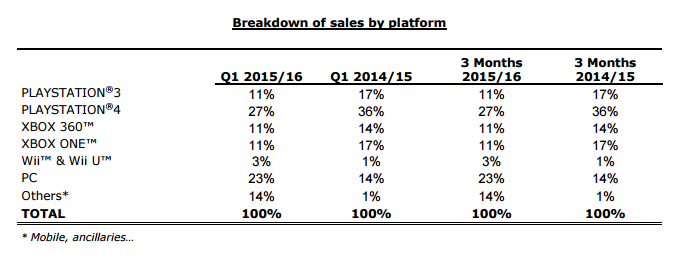French video game publisher and developer Ubisoft has revealed sales for the first fiscal quarter of 2015-16, totaling €96,6 million (about $107 million USD). Compared to the €360.1 million earned in Q1 2014-15, these figures aren't nearly as impressive. The first quarter of this fiscal year, however, which concluded on June 30, 2015, saw the release of no major triple-A titles as opposed to last year when the company shipped Watch Dogs, a record-breaking commercial success for the publisher.
Still, most surprising in the data revealed by Ubisoft lies in the sales breakdown by platform, which divides percentages into seven different categories as represented in the chart below. While unsurprising that the PS4 leads sales when broken down by platform considering its unwieldy dominance in the console space and Ubisoft's notoriety for catering to its more casual demographic, PC was the second most popular way to play Ubisoft titles in Q1 2015-16.

Perhaps most unusual was experiencing this result despite Ubisoft's claim a few years back that PC has a piracy rate of 93-95%, justifying the company's more prevalent attempts at issuing free-to-play games with an emphasis on microtransactional monetization. Perhaps the 23% of sales by platform that PC occupied last quarter was due to Ubisoft's slew of free-to-play titles. However, I struggle to believe a significant margin of gamers are spending their hard-earned money on the frankly unheard of Ghost Recon Phantoms rather than Far Cry 4 or the most recent Assassin's Creed title.
Not only are PC sales currently going strong for Ubisoft, but the gap between PS4 and PC sales narrowed last quarter as opposed to the same quarter in the 2014-15 fiscal year. PlayStation 4 previously beared a 36% share of platform sales, though that number has dropped substantially to 27% in Q1 2015-16. PC's share, on the other hand, has increased to 23% in 2015-16 from 14% a year before.
With that in mind, it will be interesting to see what the future holds for Ubisoft's role in the PC gaming market, especially considering the publisher's infamous tendency to launch PC software often plagued by subpar visuals and performance even on higher-end gaming rigs.
